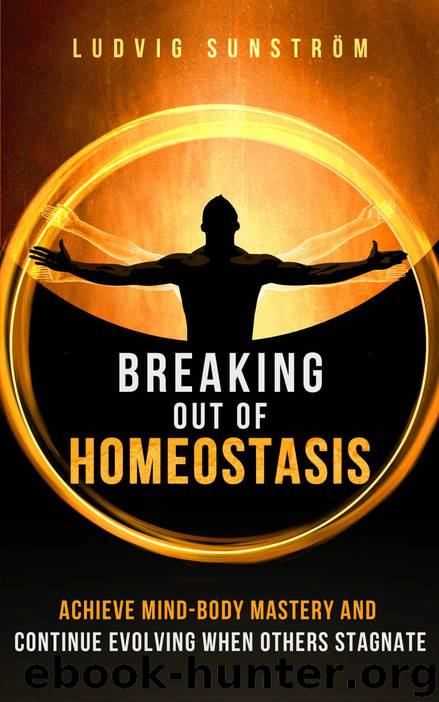Breaking Out of Homeostasis: Achieve Mind-Body Mastery and Continue Evolving When Others Stagnate by Ludvig Sunstrom

Author:Ludvig Sunstrom
Language: eng
Format: azw3, epub
Publisher: Media
Published: 2017-12-06T23:00:00+00:00
Why Thinking is Hard Work
Aristotle believed that what made man uniquely different from other animals was our ability to be rational and develop new ideas. That turned out to be a good guess.
Thanks to the neocortex we can exercise long-term thinking, order information into categories, and analyze the implications. We can conceive of intricate plans, weigh pros against cons, predict trends, and consider alternative scenarios of reality.
Those things sound good on paper, but in real life there are two strong biological disincentives against deep, reflective thinking: (1) it takes a lot of time and energy to do, and (2) it can change the structure of the brain. Homeostasis resists both.
Therefore, Homeostasis Dwellers will only think deeply when there’s a REALLY good reason for it, like if they’re encountering a serious problem. Otherwise, they’ll continue their state of mental stagnation.
Study Reveals People Don’t Like Thinking—And Some Even Prefer Electric Shocks!
"All men's miseries derive from not being able to sit in a quiet room alone."
—Blaise Pascal
Do you like to think? If so, you may be part of the minority.
In 2014, the University of Virginia wrapped up one of the largest studies ever done on the subject of thinking, with 11 variations and over 800 participants.
The study was done as follows: Participants were asked to take part in “thinking periods” of 6 minutes respectively 15 minutes inside of an empty room. They were not allowed to bring their phones, computers, books, or other material that could distract them from their thinking.
The majority of participants reported that they didn’t enjoy these “thinking periods” and struggled to concentrate. In one of the 11 variations of the study, the researchers gave participants a mild shock of static electricity. Then they asked if—supposing they were given $5—they would be willing to spend some of that money to avoid receiving another electric shock? All participants answered that, “Yes”, they would.
But the results indicate otherwise: 12 out of 18 men and 6 out of 24 women decided to shock themselves four times or more, showing that they preferred mild electrical shocks over the option of doing nothing and being alone with their thoughts.
Timothy Wilson, the social psychologist who was leading the study said, “I think they just wanted to shock themselves out of boredom.”
Download
Breaking Out of Homeostasis: Achieve Mind-Body Mastery and Continue Evolving When Others Stagnate by Ludvig Sunstrom.epub
This site does not store any files on its server. We only index and link to content provided by other sites. Please contact the content providers to delete copyright contents if any and email us, we'll remove relevant links or contents immediately.
The Ultimate Guide to Fellatio by Violet Blue(1939)
101 Get-Lean Workouts and Strategies by Muscle & Fitness(1848)
The Penis Book by Aaron Spitz(1777)
The Doctors Book of Home Remedies by Prevention Magazine Editors(1544)
The Book of Pook by Pook(1455)
Younger Next Year by Chris Crowley(1437)
The World's Fittest Book: How to train for anything and everything, anywhere and everywhere by Ross Edgley(1427)
Future Man by Tim Samuels(1377)
The Ins and Outs of Gay Sex by Stephen E. Goldstone(1333)
The Men's Health Diet by Stephen Perrine(1306)
The HIIT Bible by Steve Barrett(1295)
What to Eat When by Michael Roizen & Michael Crupain & Ted Spiker(1286)
Living An Orgasmic Life by Xanet Pailet(1284)
Flat Belly Diet! for Men by Liz Vaccariello(1277)
Anabolics E-Book Edition by Llewellyn William(1259)
The Hook Up Handbook: 28 Fundamentals to Keep Her Coming Back for More by Perrotta David(1258)
The Esquire Guide to Bodyweight Training by Adam Schersten(1251)
The Ultimate Guide to Male Sexual Health: How to Stay Vital at Any Age by Dudley Seth Danoff MD FACS(1212)
The Men's Health Home Workout Bible by Lou Schuler(1162)
